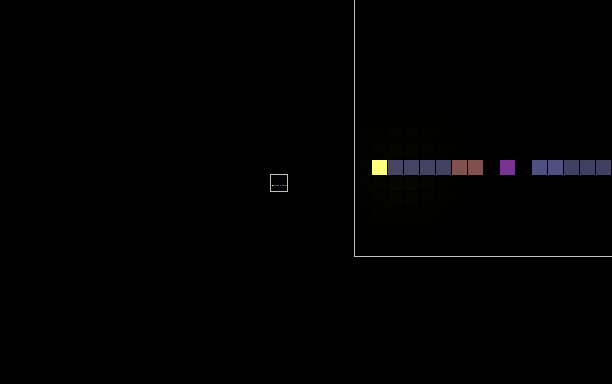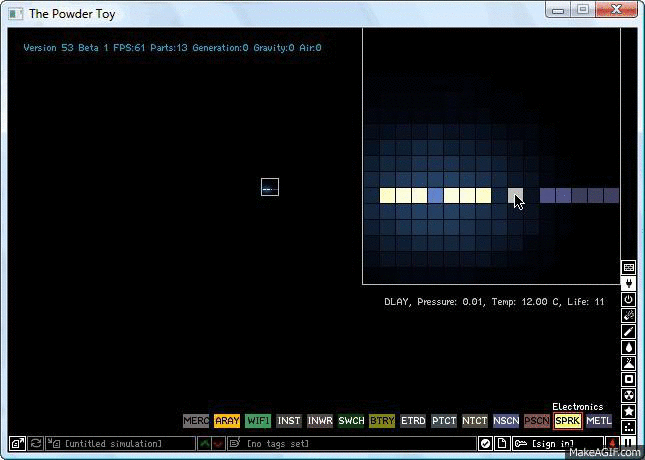Difference between revisions of "Element:DLAY"
m (1 revision) |
Neospector (talk | contribs) |
||
| Line 11: | Line 11: | ||
Here is an example of a DLAY set at 4 degrees: | Here is an example of a DLAY set at 4 degrees: | ||
| − | [[ | + | [[File:QmxUJ8.gif]] |
| − | It's delay is set by it's temperature | + | It's delay is set by it's temperature; the hotter it is, the more the spark is delayed (a negative temperature delay will absorb spark and remain constantly on), and is controlled by it's life variable. When it is sparked by PSCN, it's life corresponds to it's temperature. Each frame, it's life moves down one. When the life reaches 0, the spark is released. So DLAY at 4 degrees Celsius will last four frames. |
| − | [[ | + | [[File:W5Dm9u.gif]] |
Here is an example of how it works in a simulation: | Here is an example of how it works in a simulation: | ||
| − | + | http://i52.tinypic.com/zmfegy.jpg | |
DLAY will work fine in large numbers, however there must be a two pixel gap between the PSCN and the NSCN, otherwise the spark will jump the 1 pixel gap and there will be a double spark, which can be useful in some situations. | DLAY will work fine in large numbers, however there must be a two pixel gap between the PSCN and the NSCN, otherwise the spark will jump the 1 pixel gap and there will be a double spark, which can be useful in some situations. | ||
Revision as of 02:30, 28 January 2012
DLAY is a new element coded by arK, it can be found in the Powered Materials category.
It works like this:
- Accept current only from PSCN or NSCN
- Transfer current only to PSCN, NSCN or SWCH
- Does not transfer current back to where it came from
- Does not conduct heat (to be used with HEAT/COOL)
- Delay current transfer to the amount of frames equal to its temperature
- Can accept current immediately after delay is over (not like water -_-)
Here is an example of a DLAY set at 4 degrees:
It's delay is set by it's temperature; the hotter it is, the more the spark is delayed (a negative temperature delay will absorb spark and remain constantly on), and is controlled by it's life variable. When it is sparked by PSCN, it's life corresponds to it's temperature. Each frame, it's life moves down one. When the life reaches 0, the spark is released. So DLAY at 4 degrees Celsius will last four frames.
Here is an example of how it works in a simulation:
http://i52.tinypic.com/zmfegy.jpg
DLAY will work fine in large numbers, however there must be a two pixel gap between the PSCN and the NSCN, otherwise the spark will jump the 1 pixel gap and there will be a double spark, which can be useful in some situations.

